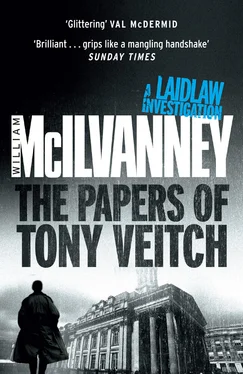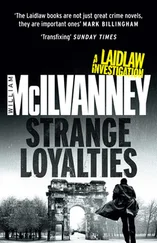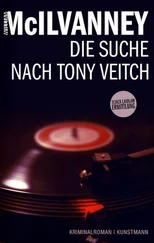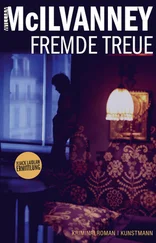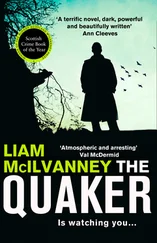William McIlvanney - The Papers of Tony Veitch
Здесь есть возможность читать онлайн «William McIlvanney - The Papers of Tony Veitch» весь текст электронной книги совершенно бесплатно (целиком полную версию без сокращений). В некоторых случаях можно слушать аудио, скачать через торрент в формате fb2 и присутствует краткое содержание. Год выпуска: 0101, Издательство: Canongate Books, Жанр: Полицейский детектив, на английском языке. Описание произведения, (предисловие) а так же отзывы посетителей доступны на портале библиотеки ЛибКат.
- Название:The Papers of Tony Veitch
- Автор:
- Издательство:Canongate Books
- Жанр:
- Год:0101
- ISBN:нет данных
- Рейтинг книги:3 / 5. Голосов: 1
-
Избранное:Добавить в избранное
- Отзывы:
-
Ваша оценка:
- 60
- 1
- 2
- 3
- 4
- 5
The Papers of Tony Veitch: краткое содержание, описание и аннотация
Предлагаем к чтению аннотацию, описание, краткое содержание или предисловие (зависит от того, что написал сам автор книги «The Papers of Tony Veitch»). Если вы не нашли необходимую информацию о книге — напишите в комментариях, мы постараемся отыскать её.
The Papers of Tony Veitch — читать онлайн бесплатно полную книгу (весь текст) целиком
Ниже представлен текст книги, разбитый по страницам. Система сохранения места последней прочитанной страницы, позволяет с удобством читать онлайн бесплатно книгу «The Papers of Tony Veitch», без необходимости каждый раз заново искать на чём Вы остановились. Поставьте закладку, и сможете в любой момент перейти на страницу, на которой закончили чтение.
Интервал:
Закладка:
‘How would I know?’
‘And how would I? But I would bet. I’d find him for myself. I’d need to know what happened. If wee Jackie grew up and got involved in this way, I’d have to know what I had done as well. Jesus, I could make a better father than him out of raffia.’
Harkness looked at him worriedly. Laidlaw was too vehement. Harkness had been working with him for over a year now. In that time he had seen an intensification take place in Laidlaw. Whatever forces were working themselves out in him, they were accelerating. Laidlaw was forty now but that anger against so many things that ticked in him like a geiger-counter was in no way mollified by middle-age.
Harkness thought he knew some of the pressures that relentlessly maintained the tension of his nature. He had been at Laidlaw’s house a few times and had seen that in the wreck of his marriage he was using himself as a lifebelt for his three children. Laidlaw’s insistence on staying during some important cases at the Burleigh Hotel in Sauchiehall Street could hardly be due to the comfort and cuisine to be found there. It was more due, Harkness was sure, to Jan the receptionist. When you added Laidlaw’s natural tendency to look for any storm in a port you had a recipe that might have blown the lid off a pressure-cooker.
‘Okay, Jack,’ Harkness said. ‘Where to? East Kilbride?’
‘She won’t be in. Back into the city, Brian. Anyway, even if she was in, we couldn’t outdrive a phone-call.’
‘What?’
‘Mr Veitch is phoning her right now. You can bet on it. Galahad is alive and well. And playing with himself.’
Driving, Harkness remembered something.
‘Here. Why no whisky again? This could get monotonous.’
‘I take water with my whisky,’ Laidlaw said. ‘Not condescension.’
13
‘. . in this crowd deaf to its own cry of hunger and misery, revolt and hatred, in this crowd so strangely garrulous and dumb.’
Gus Hawkins was reading the end of the sentence again when the knock came at the door. He was eating a folded slice of bread and jelly, a Saturday lunchtime return to the comfort food of childhood, and drinking the last of his tea. His mother was clearing the table. His father sat in his armchair, a telly cataleptic. Gus made to get up.
‘Ah’ll get it, son,’ his mother said. ‘It’s likely Maggie from downstairs.’
But her startled ‘Oh’ as she opened the door made Gus look up to see his brother standing there, wearing his scar like an embarrassing admission in front of his mother of the kind of work he did. He gave her an operatic embrace and winked over her shoulder at Gus. His jollity was a smoke-screen.
‘How’s the best wee ma in Britain? Aye, Da. Ah’ve got a mate with me, Ma. We’re here to talk to Mastermind there.’
‘Jimmy! Ah thought ye’d forgotten the address.’
What should have been anger became laughter in her mouth by the alchemy that enables mothers to transmute their children into what they believe them to be.
‘No chance. This is a mate up from Birmingham. Mickey Ballater.’
Gus looked at the big man who stepped in behind his brother. Whatever he did in Birmingham, he wasn’t a bank-clerk. Gus’s mother shut the door.
‘Come in, son. Come in. Mickey, is it? Ah’ll make a cuppa tea. We’re just finished. Gus comes every Saturday fur his dinner. Then Ah know he’s gettin’ at least wan good meal in the week. Ah don’t know why he canny stay here a’ thegither. But that’s the young yins nowadays.’
‘Ah know whit ye mean,’ Mickey Ballater said.
‘Ma. Don’t bother wi’ tea. We’re on our way somewhere. We were passin’ an’ we jist came in to settle an argument. Ah told ’im ma brother’s a genius. He would know.’
Gus realised that his brother was improvising desperately, didn’t know what to say next. Hook Hawkins noticed that the doorway to the balcony was open and continued talking.
‘Look, we’ll no’ disturb ma Da’s telly. We’ll nip out on the balcony. Okay, Gus?’
He went out onto the balcony, followed by Mickey Ballater.
‘Fair view, innit?’ he said.
‘No’ bad at all.’
Gus put down his book slowly. He looked at his mother and couldn’t be sure whether her expression was what she really felt or a determined cover-up. It seemed to suggest her older son was an awful wag. Gus crossed and stepped out onto the balcony.
Three was a crowd out there. It was thirteen storeys up and Mickey Ballater seemed impressed.
‘Never seen the Gorbals from this high up. Seen it from doon there, right enough. Surprised how wee it is. When Ah wis in among it, Ah thought it went on forever. Ah suppose this is progress, eh?’
Gus said nothing. Half of his head was still dealing with Aimé Césaire’s Return to my Native Land . He hadn’t worked out how he came to be standing on the balcony of his parents’ house with his brother and another heavy. He was waiting to catch up with events.
‘Gus,’ Hook said. ‘Mickey wants to ask you about Tony.’
‘Tony who?’
‘Come on, Gus. Tony Veitch.’
‘Tony Veitch? What’s this about?’
‘Tony Veitch,’ Mickey said.
‘What’s he to you?’
‘Money,’ Mickey said. ‘That’s what he is. Just money.’
‘What do you mean?’
‘He owes me money.’
‘Tony owes you money?’
‘Ah’ve come a long way,’ Mickey said. ‘It’s gettin’ to feel longer. Ah didn’t do it for nothin’. He owes me money.’
Gus saw his father still watching television, his mother clearing up. The programme was an old film on BBC2, a grey actor talking nonsense to a grey actress listening nonsensically. It was the kind of film about which the clever Sunday papers would find something clever to say, like ‘a delicate sense of period’ or ‘survives in spite of itself’. It was just crap, a lot of people making what money they could in the way they knew best.
Gus felt angry. Why was his father watching it? He had had a life more harrowing than any of their melodramas. And he hadn’t once seen what had happened to him shown on that screen. Gus saw his parents in cameo, peripheral to this moment, peripheral to their own sons, frozen into decoration. He resented it. His anger spilled over.
‘What’s this about?’ he said to his brother.
‘Mickey’s just askin’ a question,’ Hook said. ‘Where’s Tony Veitch?’
‘Naw.’ Gus was staring at his brother. ‘What’s this about?’
‘Where’s Tony Veitch?’ Mickey said.
Gus didn’t look at him.
‘I’m talking to my brother,’ he said. ‘What’s this about?’
‘Gus,’ Hook Hawkins said. ‘People are lookin’ for Tony.’
Gus looked at his parents a moment.
‘Why don’t you organise gang-fights in the kitchen?’ he said. ‘You bring a hoodlum to ma mammy’s house?’
‘Listen,’ Mickey said.
‘Naw. You listen.’ Gus Hawkins looked like a bomb that might soon explode. He was staring at Ballater. ‘This is where good people live. We don’t need you.’
A signal went off in Mickey Ballater’s head. He remembered a chip-shop in the Calton. He had been young and hard and drunk, and he had casually insulted a small, middle-aged man. He had said for the titillation of bystanders, ‘Somebody in here’s fartit. It wis you!’ pointing at the small man. The small man had said nothing, paid for his chips and gone out.
Mickey Ballater had forgotten he said it by the time he came out the door, when he forgot everything for several minutes. He worked out later that the small man must have hit him from the side as he came out, presumably with a gib-crane he had handy. Since then, Ballater had understood that the fiercest man is the one who has had his incomprehensibly private values encroached upon. Attack a mouse in its hole and it will try to nibble you to death.
Читать дальшеИнтервал:
Закладка:
Похожие книги на «The Papers of Tony Veitch»
Представляем Вашему вниманию похожие книги на «The Papers of Tony Veitch» списком для выбора. Мы отобрали схожую по названию и смыслу литературу в надежде предоставить читателям больше вариантов отыскать новые, интересные, ещё непрочитанные произведения.
Обсуждение, отзывы о книге «The Papers of Tony Veitch» и просто собственные мнения читателей. Оставьте ваши комментарии, напишите, что Вы думаете о произведении, его смысле или главных героях. Укажите что конкретно понравилось, а что нет, и почему Вы так считаете.
